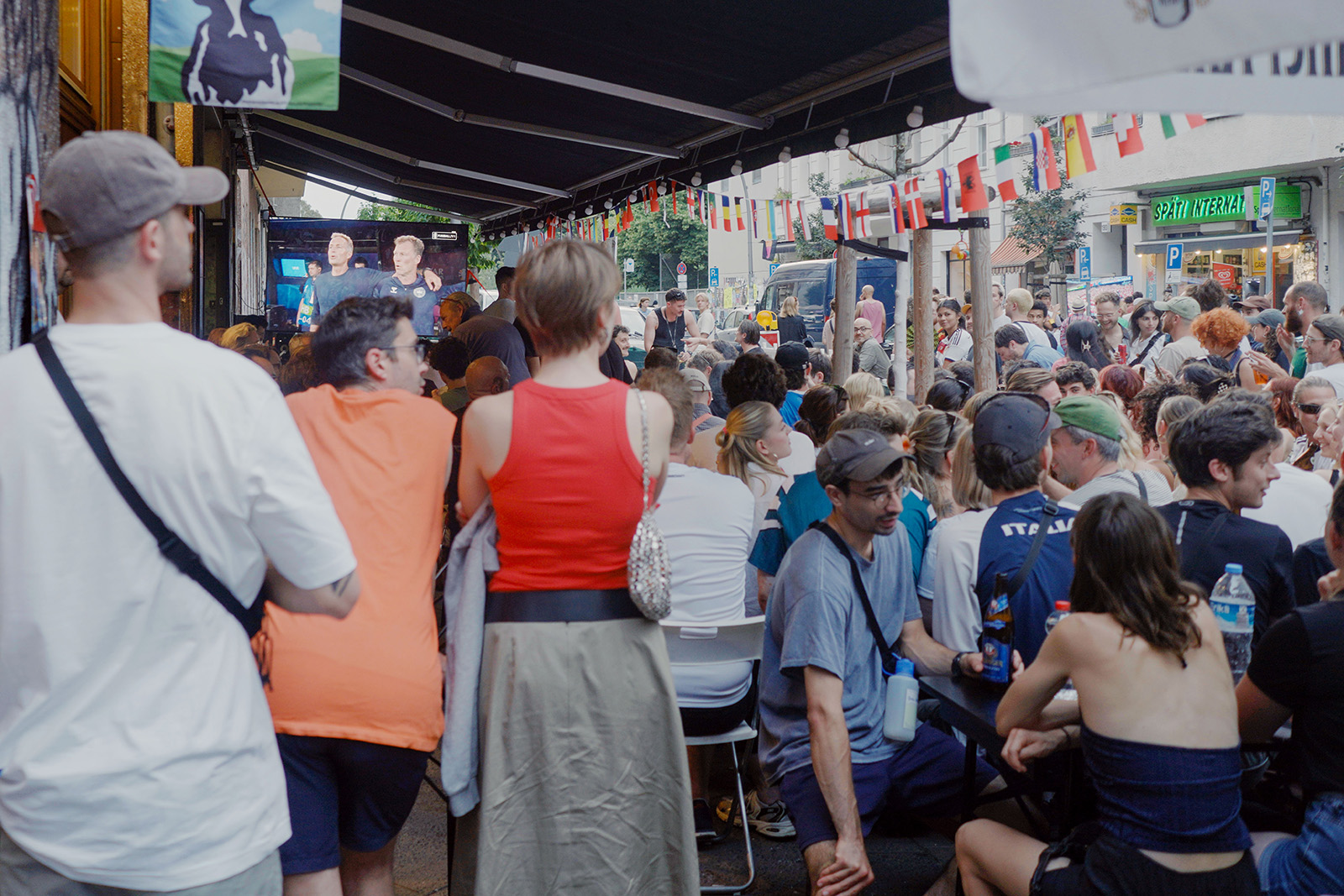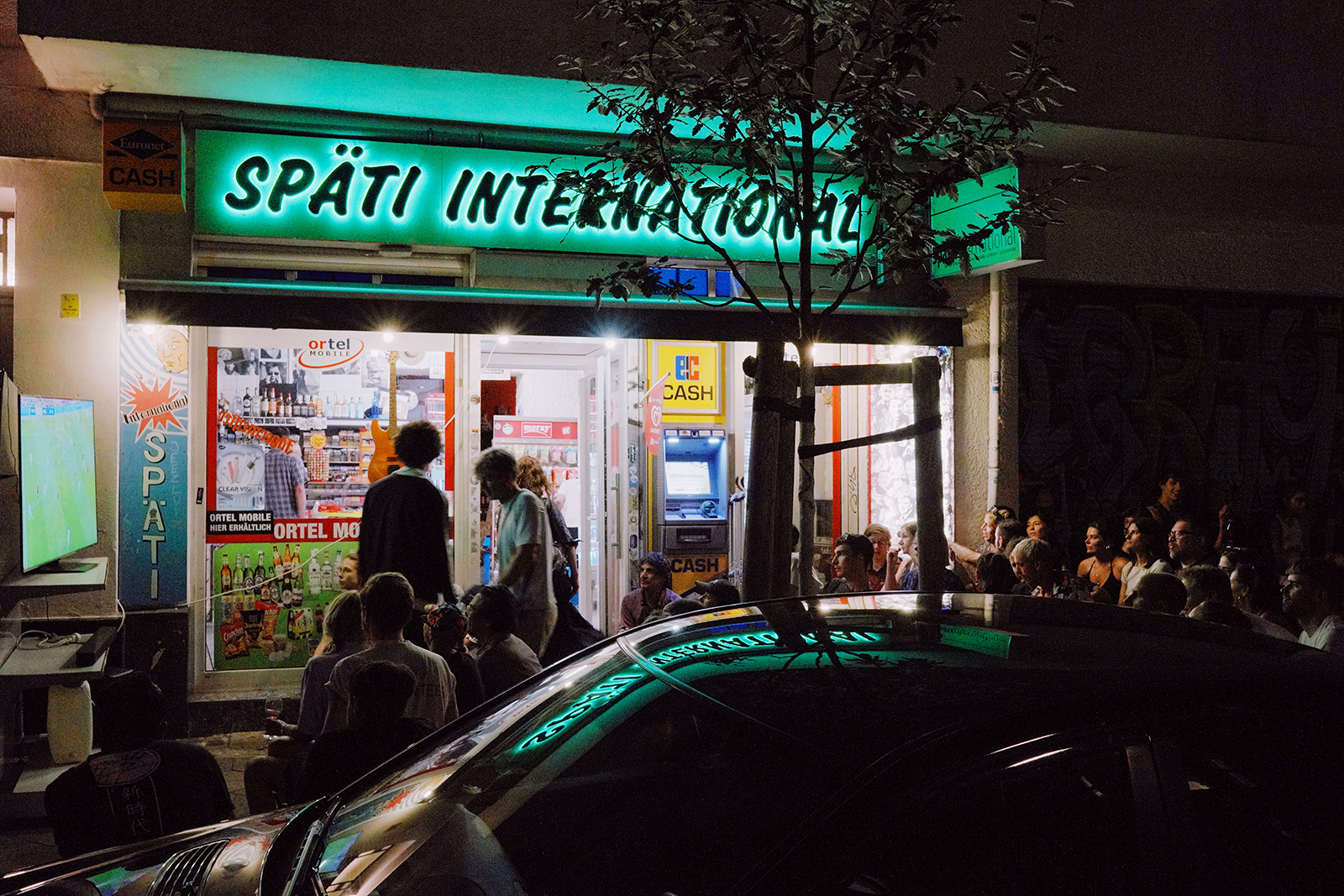The corner shops at the heart of Euro 2024
Cheap beer and a community experience drive fans in Berlin to immigrant family-run Spätkaufs to watch the big matches
–

Euro 2024 fever has hit this year’s host nation, Germany. For those not lucky enough to have scored stadium tickets, there are plenty of options for watching the matches, from beer gardens to massive screenings in parks. But one of the favourite spots for Berlin residents is the local Späti — short for Spätkauf (late shop). These small convenience stores, open 24 hours selling beer, tobacco and snacks, and usually run by immigrant families, will often put up screens for neighbours to gather and watch big matches together.
Späti are compared to corner shops in the UK or bodegas in New York, but in the German capital they are particularly close to residents’ hearts. Many were set up by former “guest workers” from Turkey, who emigrated to Germany in the 1960s. “It’s part of Berlin culture,” explained Fatima, 37, who manages Späti International on Weserstraße, in the multicultural Neukölln neighbourhood. “It’s somewhere all the kiez come together. We know all our neighbours here, kids and adults.” Kiez is a Berlin word describing a small, close community. Most Spätis have tables and chairs outside so even when there isn’t football to watch kiez-dwellers gather here to relax, socialise and get to know each other.
This is a particularly celebratory tournament in Germany. Not only is the host nation’s national team through to the quarter-finals, but so is Turkey — a country that three million German residents have roots in.
Fatima was born in Turkish Kurdistan and her mother founded their Späti more than 20 years ago. This is the first year they are showing the football on a big screen outside the store and have set out extra benches. She’s not a football fan herself, but Fatima wanted to do something for her kiez. “I don’t care who wins, I just hope it’s the best team,” she laughed.
At another Späti further along the same road, brothers Dominic and Jonathan Gach, 37 and 34, both wearing Germany shirts, sit enjoying a beer before watching Germany beat Denmark. “You want to support your local Späti!” Jonathan said. “It’s a community thing. Everyone gathers here, both rich and poor.”
Another fan, 33-year-old architecture student Michael, agreed. “It’s more of a relaxed atmosphere,” he said. “You’re not going to get the hardcore, hooligan-type fans. And the beer is cheap!”
There are so many Spätis in Berlin that a first-time visitor might wonder how they manage to make a profit with so much competition. To stand out, many try to offer something different — one might have a wide selection of craft beers, another might specialise in different sweets or chocolate, others sell coffees and baked goods.
Osman Östürk, who runs a Späti on Reisenberger Straße in Kreuzberg, founded by his uncle, likes to boast that he has “the best Späti in Berlin”. A large premises, it sells groceries and baked goods, and offers the bonus of allowing customers to use its toilet (which not all do). It’s one of the best-known football screening spots in the area, showing every single match, whatever the weather. The huge screen is protected with plastic and there are two large beer garden-style umbrellas on the pavement.
Östürk is a football fanatic who in his youth lived between Germany and Turkey, where he played professionally. He believes Spätis thrive even as Berlin gentrifies because tourists recognise they offer something simple but special. “Young people come and see they can buy alcohol at all hours of the night,” he said.

On Weserstraße in Neukölln, Campus Späti is a local institution known for its unusual produce, including speciality Italian sweets. It always screens Euro and World Cup tournaments, and this year has teamed up with the bar next door to create a screening area that takes over the entire pavement outside. Bar manager Nino (who preferred not to give his full name) explained that getting permission was an arduous process that involved drawing a map of the whole street. Local police have ordered them to shut down a few times when the post-game party became too raucous. “But I think a lot of Spätis around here don’t ask permission before putting a screen out,” he said. “They just do what they want, and that’s the character of this neighbourhood.”
This free-spirited, fun atmosphere often spreads to other local businesses. During Turkey’s first game against Georgia, Farooq Uzun, who runs electrical appliances shop Siltem.de with his two brothers, spontaneously decided to erect a screen outside on top of two washing machines. “We were actually going to watch it at home, but then we saw the Späti was full, the café was full, there were lots of people on the street,” he said.
Uzun, who moved to Germany from Turkey when he was 15 to join his guest worker parents, dreams of a Turkey v Germany final. “I have two homelands. I love them both equally,” he said. “I see the good and bad sides of both.” But even though both teams have made the final rounds, he’s not overly hopeful. “I think Spain might win,” he said.
Even with this festival atmosphere, the tournament hasn’t escaped Germany’s darkening political climate. On the same weekend the national team qualified for the quarter-finals, having beaten Denmark 2-0, the far-right AfD party — whose members were recently caught discussing plans to deport people with non-German heritage — held a conference to celebrate coming second in the EU parliamentary elections. The current lineup is one of the most diverse in German football history, and captain Ílkay Gündoğan is of Turkish heritage. But one survey by a public broadcaster in May found that 21% of the German public wanted to see “more white players” on the national team.
Just as Spätis unite local communities, football is often touted by institutions such as Fifa as being a unifying force. Dominic Gach nostalgically remembers the last World Cup Germany hosted in 2006 as a time of national coming together: “Identifying with the German flag became a more positive thing, whereas it had always been rather difficult before.” Gach still believes in the power of the beautiful game to unite. “Even when you are playing football as a hobby, you get in contact with so many people from different backgrounds,” he said.
This isn’t always a positive experience, however, particularly when non-white players disappoint fans. During the 2023 Bundesliga season, Black players Jessica Ngankam and Youssoufa Moukoko — who both play for German national teams — were racially abused after missing penalties for their clubs.
Nino from the Campus Späti bar wonders if football doesn’t serve as a helpful distraction from deeper, more disturbing national problems. “Of course it unites people but it definitely takes our minds off things that are more important right now,” he said. “There’s so much else going on that we should be talking about, but everybody is talking about football.”
Topics
Get the Hyphen weekly
Subscribe to Hyphen’s weekly round-up for insightful reportage, commentary and the latest arts and lifestyle coverage, from across the UK and Europe
